Elle Fanning, Camila Cabello, and Aja Naomi King on What Beauty Means to Them
When you look at the April cover of Glamour, there’s no question that the three women pictured on it—Elle Fanning, Camila Cabello, and Aja Naomi King—are beautiful. I mean, just look at them. But, like the rest of us, they haven’t always felt confident in their own skin: As a kid (and before her Fifth Harmony days), Camila says she never saw herself—a Cuban-Mexican immigrant—represented in pop culture. When she first started playing with makeup, Aja found that some products just didn’t show up on her dark skin—and that stung. And Elle, who has been in the Hollywood spotlight since age three (yes, three), admitted to feeling pressure to conform to old beauty ideals by straightening her naturally curly hair for her first day at public school.
Isn’t it about time we rewrite this conversation? In honor of International Women’s Day, I spoke with all three of these remarkable women about how our definitions of beauty are finally shifting. As Camila put it: “When you look at the cover with me, Aja, and Elle, you see different body shapes, different skin tones, different backgrounds. It just shows you that beauty looks like everybody, you know?” Yep, we know.
Elle Fanning
Forty-five. That’s how many movies Elle Fanning, at age 20, has under her belt. I wasn’t convinced that was even possible until I counted them myself. You can literally see her grow up onscreen, under the Hollywood spotlight: at age three, playing the younger version of big sister Dakota in I Am Sam. As a dreamy young girl in Sofia Coppola’s Somewhere. And kicking off 2018 with critical favorite I Think We’re Alone Now, a post-apocalyptic love story from buzzy director Reed Morano.
Still, Fanning tells me she’s never felt scrutinized for her appearance by the industry, which has been pretty accepting of her playful makeup looks (just part of the appeal when L’Oréal Paris signed her as a face last year) and quirky fashion sense (frilly Rodarte pants are kind of her thing). It was her contemporaries—kids at school—who made her feel she should conform to a certain mold. So what does she want to say to the world about beauty and feeling good in your skin? Hear it in her words.…
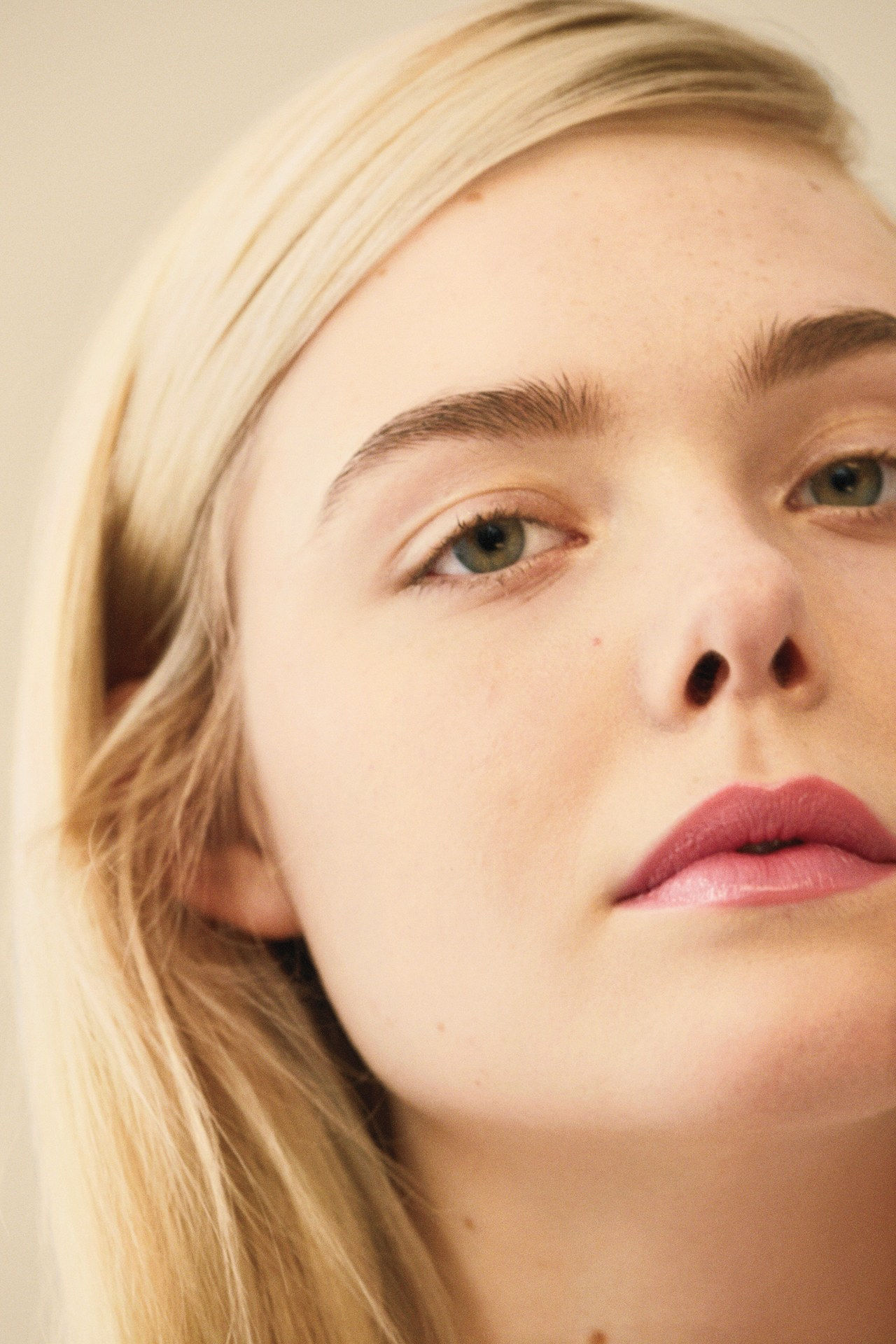
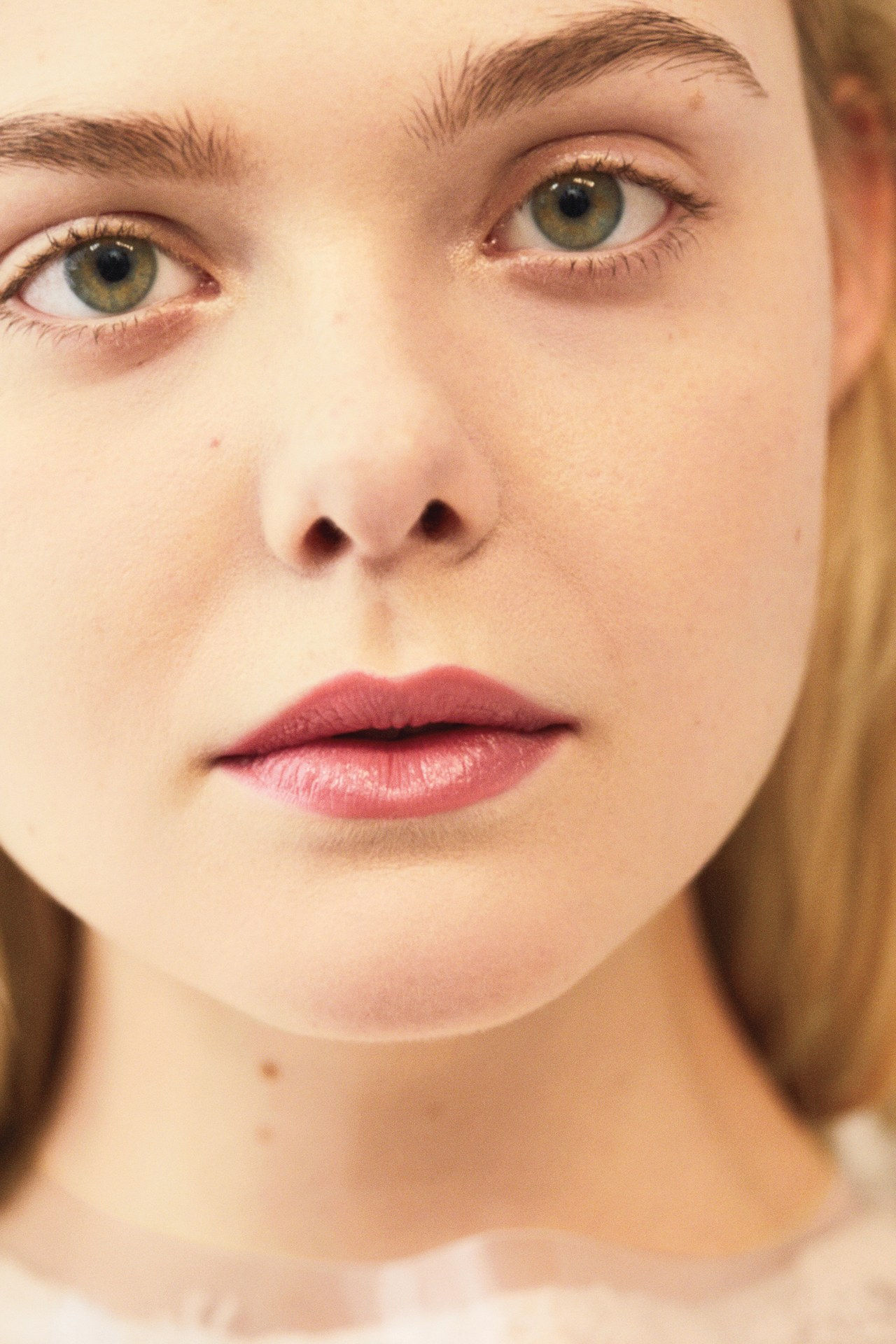
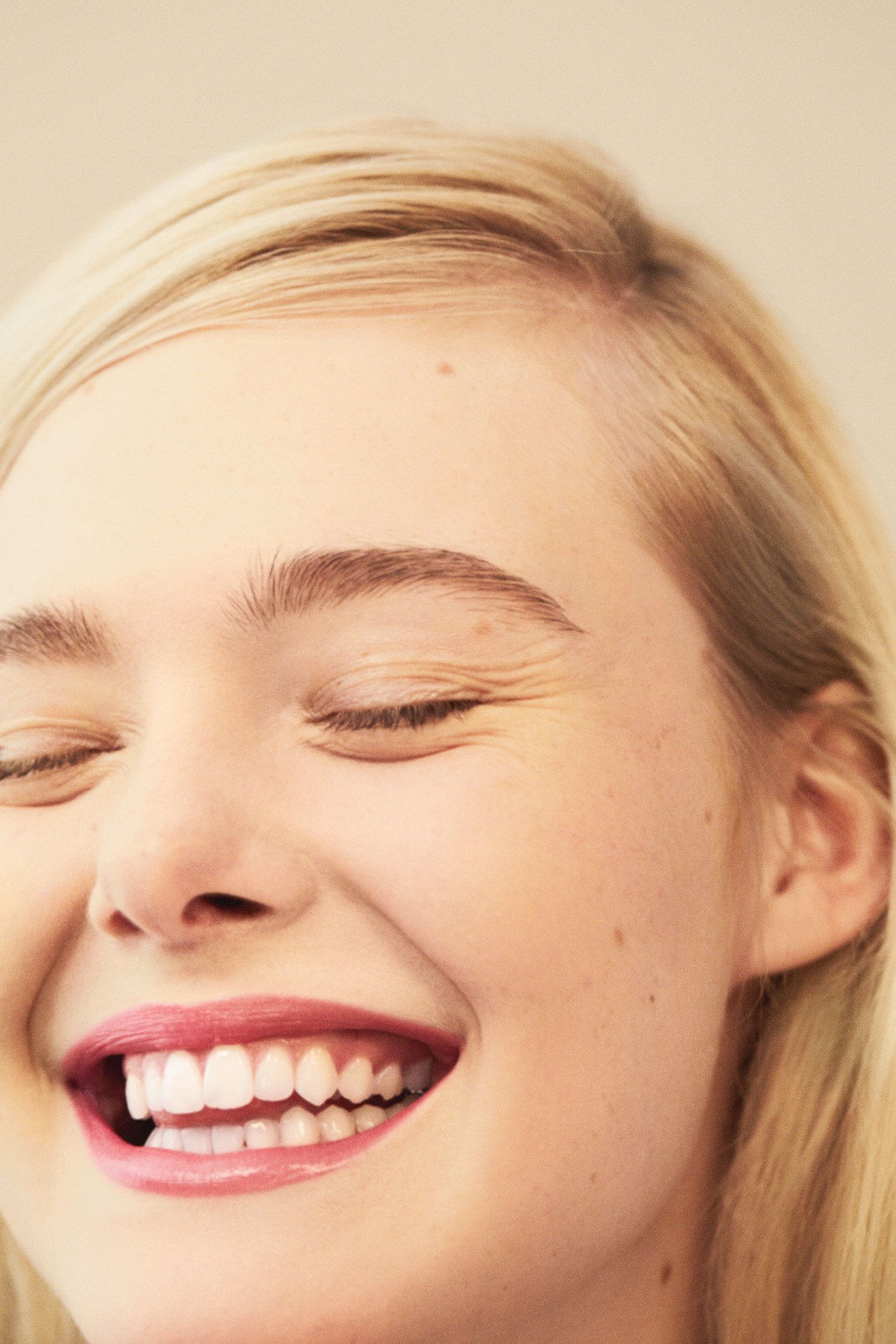
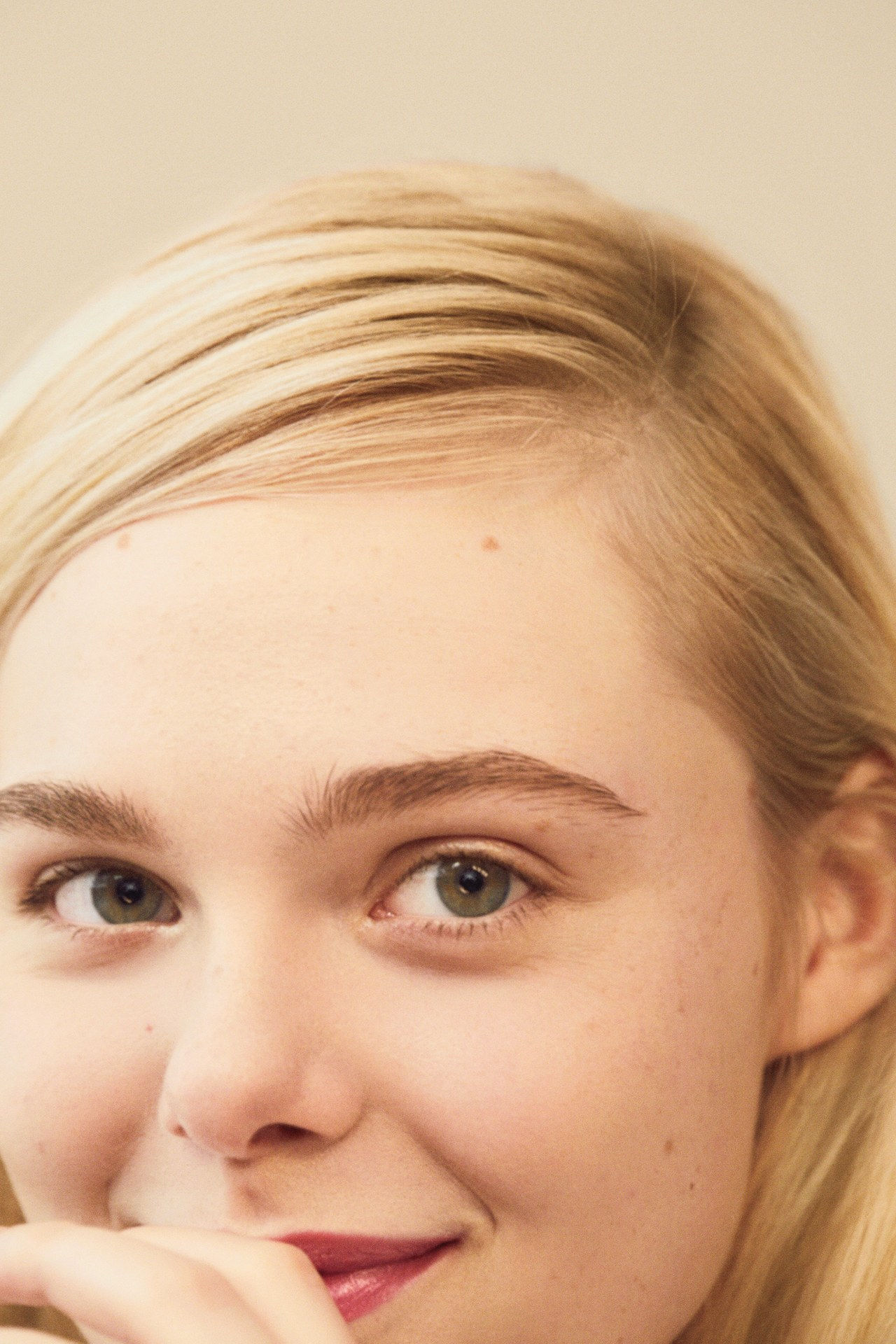
GLAMOUR: This is your first Glamour cover. Will you share what it means to be starring in the beauty issue?
ELLE FANNING: Well, beauty is not just what you look like from the outside. I’ve certainly experienced not feeling super confident. I was home-schooled until third grade. In fourth grade I went to a regular school, and it was the first time I had been in a classroom with kids my age, so I was a little freaked out. My hair is actually really curly, so I got it blown out straight, and I wore contacts—my eyes are terrible—and this one boy came to me on the playground and said, “You’re so beautiful. I’m going to marry you!” Whatever. Then the next day I washed my hair, so it was curly, and wore my glasses. And he told me, “I’m not going to marry you anymore.” I’m like, What? All because of physical appearance? Heartbreaking.
GLAMOUR: So even a nine-year-old boy was programmed to think that straight hair was beautiful. Traumatizing.
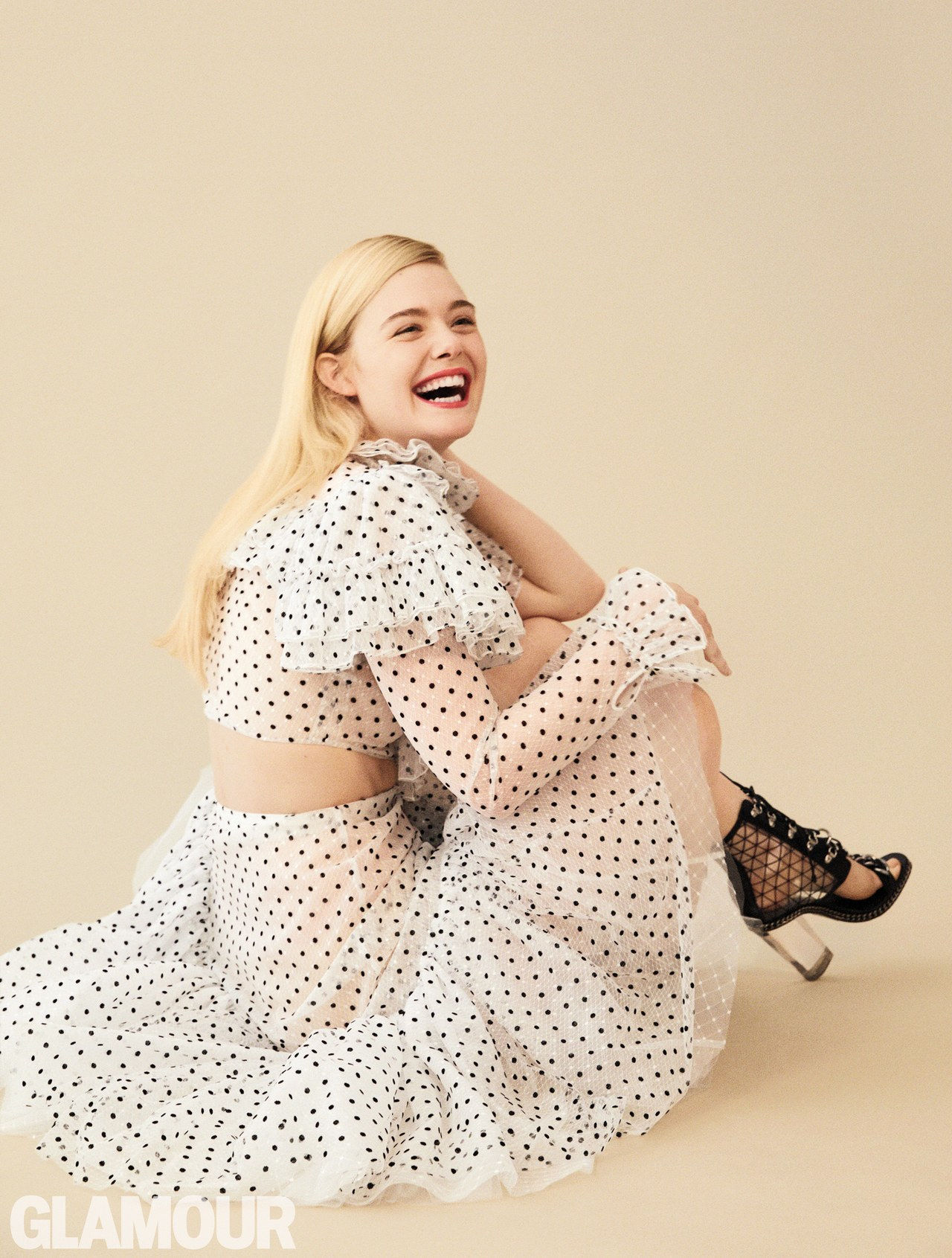
Rodarte top, skirt. Balmain boots.
EF: Think of The Princess Diaries, which I love, where she has glasses and really curly hair, and then you remove those and: Wow! She’s so hot.
GLAMOUR: So how do we all move beyond the old beauty ideals?
EF: I think it starts with what people put out there. Airbrushing is not attractive. Imperfections are what’s beautiful. I like to post funny, not-so-serious things.
GLAMOUR: You’ve talked about growing up with a lot of women—sister, mom, grandmother. Was there bonding around beauty?
EF: My mother is very natural. But my grandmother will not go out of the house without a full face—she piles it on. She’s blond and blue-eyed and looks like me. And she always does a full lip, with matching liner in a peach tone. She was really excited when I signed with L’Oréal, freaking out, actually. They sent her a whole bag of lipsticks, which was really nice.
GLAMOUR: Being in Hollywood so young, did you feel pressured to look a certain way?
“Beauty is not just what you look like.”
EF: Mostly at school. In a weird way I felt that the red carpet or the movie world was a place to escape and wear my funny clothes—frilly Rodarte pants instead of skinny jeans and the bandage dresses girls wore to bat mitzvahs. At work, there would be older people around who were like, “Hey, that’s cool!”
GLAMOUR: Did you ever feel sexualized at too young an age?
EF: No, I always had really good people around me, making sure that didn’t happen. They were sometimes overprotective. But I did have my first kiss onscreen, for the film Ginger & Rosa. I was 13 and trying to hide that it was my first kiss. But the director knew. So they pulled out this giant binder of guys from casting, and I had to pick one. It was one scene, his name was Max. And I picked him.
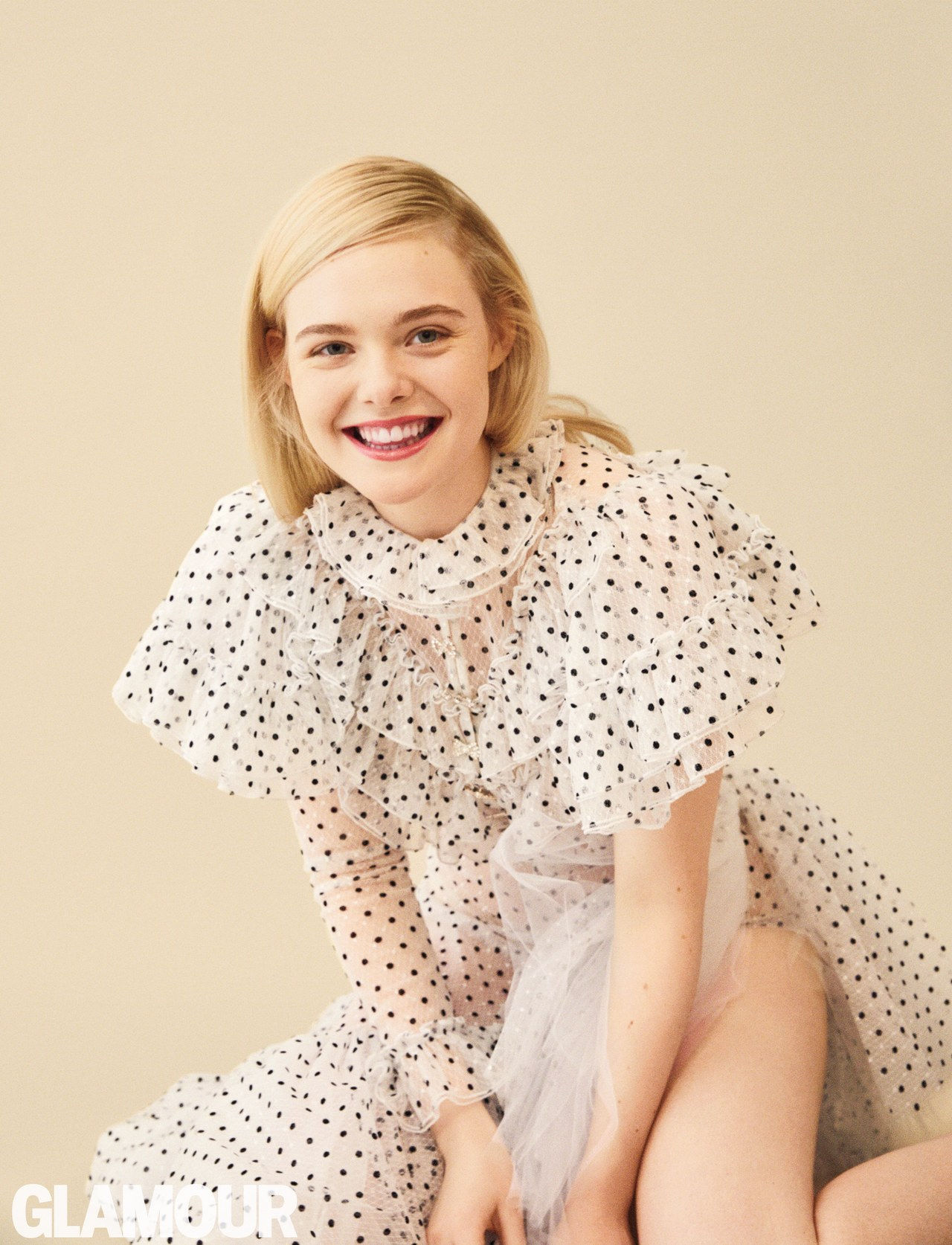
“Being young, I love to experiment with makeup. Stuff where you think, Oh God, that wasn’t right—but I’d like to try it out!”
GLAMOUR: It’s a powerful moment for women in Hollywood, with open conversations around sexism and inequality. Can you talk about the experience with female directors—Sofia Coppola when you were 12 for Somewhere, and Reed Morano last year?
EF: Reed is one of my favorite people in the world. I felt so safe having her behind the lens. As women, there’s just a camaraderie, an understanding of each other. And shooting with Sofia when I was so young—it was very special to get to see a big movie set run by a woman, to see what’s possible, the respect. I would love to direct one day too. Women have so many stories to tell. Why haven’t we been able to for so long? We’re just starting.
GLAMOUR: You met Valerie Weisler—the 19-year-old founder of antibullying organization The Validation Project—at L’Oréal’s Women of Worth event. Did her message hit home for you?
EF: From her own experience of being bullied, she has gone on to help 6,000 other teenagers. She’s my age—and it’s just inspiring that she found something she’s so invested in. She pushed me to reevaluate myself, in what I can give back. That’s empowering.
Camila Cabello
I’ll admit: I’m not your die-hard Fifth Harmony fan (sorry, Harmonizers!). But even before signing on to interview Camila Cabello for Glamour, I found myself humming her catchy single “Havana” while riding the subway or sitting in a meeting at work. Her peppy breakout track, which has been on Billboard’s Hot 100 for 26 weeks and counting, just wouldn’t leave my head.
Since launching her solo career at the end of 2016, the Cuban Mexican singer, 21, has been busy. She wrote every single song for her first solo album, Camila, and got lost in a very private romance that has shaped much of it. (The original name was The Hurting. The Healing. The Loving., but “I had just moved on from that situation,” she says. “I was like, I’m so over this. My music is over this too.”) She also gave a heart-wrenching Dreamers speech at the Grammys and landed a big-deal beauty gig as a spokesmodel for L’Oréal Paris. What’s so striking to me about Cabello is that she’s beloved for the very thing that some people vilify right now: her immigrant background. Her connection to her Latin roots comes out in her music, her performances, her styling. We talk about how all those things are connected for her.
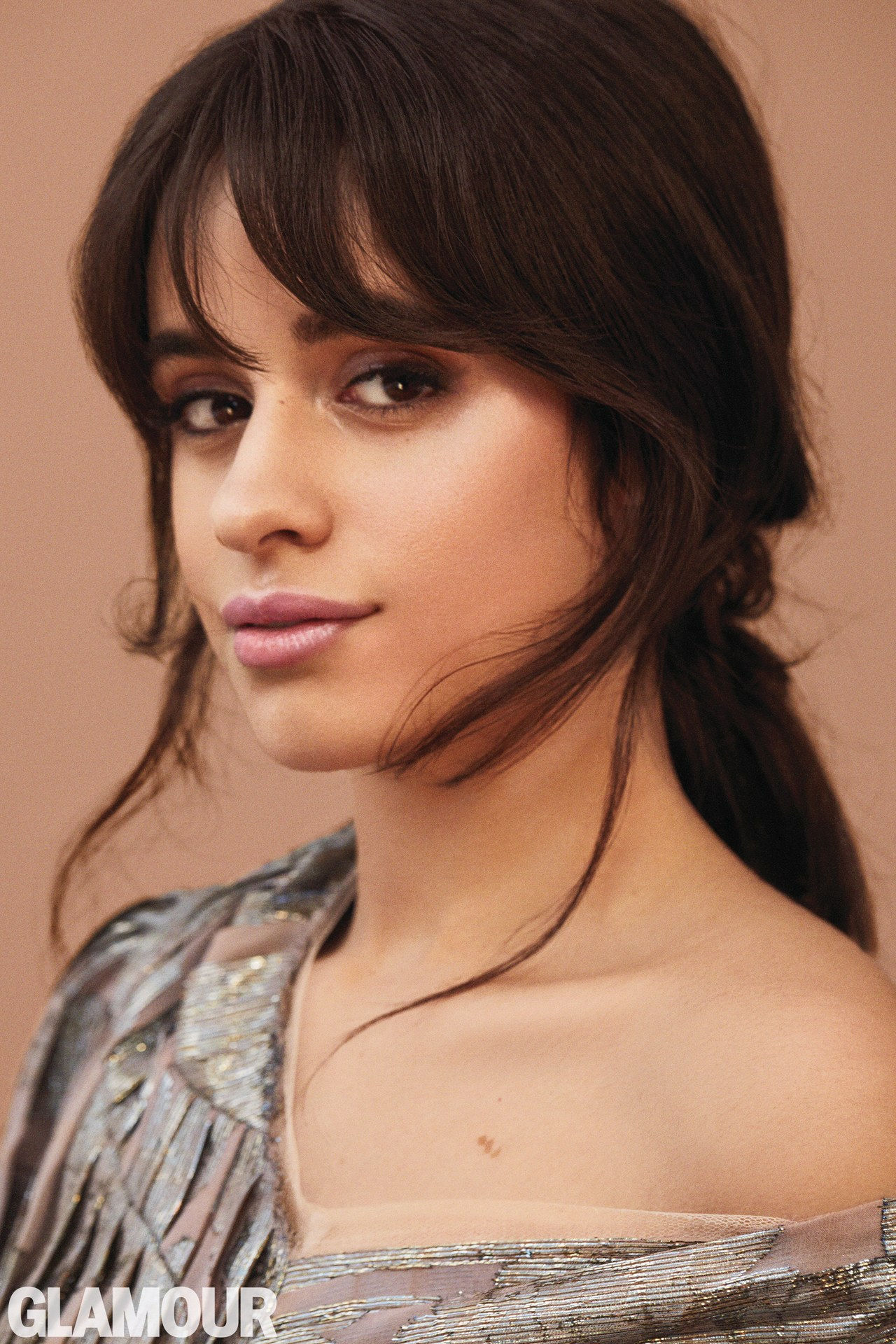
“When I was a kid, I didn’t see myself represented in pop culture.”
Preen by Thornton Bregazzi dress.
GLAMOUR: First off, your album Camila is killing it. And “Havana” is number one. Congrats! How does it feel?
CAMILA CABELLO: It’s super cool that “Havana” is doing this thing in the U.S. and all over the world while there’s an anti-immigrant sentiment going on. It’s my form of sneaky rebellion. That song is based off being an immigrant: “My heart is in Havana, take me back to my Havana.” So many people are singing to [my lyrics], and it just breaks down barriers, whether people know or it not.
GLAMOUR: Why is speaking to immigrants so important for you?
“Beauty is in the different things we all have. It’s not one kind of person, shape, one kind of anything.”
CC: It’s important for me to be outspoken about my background as a Latina. All the traditions we have—my family, my temper, falling in love, how I eat, how I dance—it’s such a huge part of who I am. It doesn’t matter where you come from, nobody can tell you where you’re going. I didn’t even think that [music] was a plausible career for me, because I was living in Miami with immigrant parents who just wanted me to focus on school. Everybody I went to auditions with was born in L.A. or New York [with means]. There was nobody I could look up to. I didn’t see myself represented in pop culture.
GLAMOUR: How did that impact your self-confidence as a kid? What was the beauty ideal around you?
CC: The good thing was I grew up around a lot of Latin people in Miami. It was a melting pot of cultures. I wasn’t surrounded by one type of person. But still, there was a period when I really wanted light eyes. It was only as I got older that I was like, “I like my brown eyes, I like my black hair, I like my skin. I don’t need to be blond and blue-eyed.” There are still things I’m insecure about, like my crooked teeth, but I think part of beauty is accepting imperfections. The more I meet people and see the world, the more I realize it’s those little quirks—a birthmark, a crooked tooth, a scar—that makes you you. As they say with art: Perfect is boring.
GLAMOUR: Once you came into the public eye—you were 15 when you joined Fifth Harmony—was there an expectation to look a certain way?
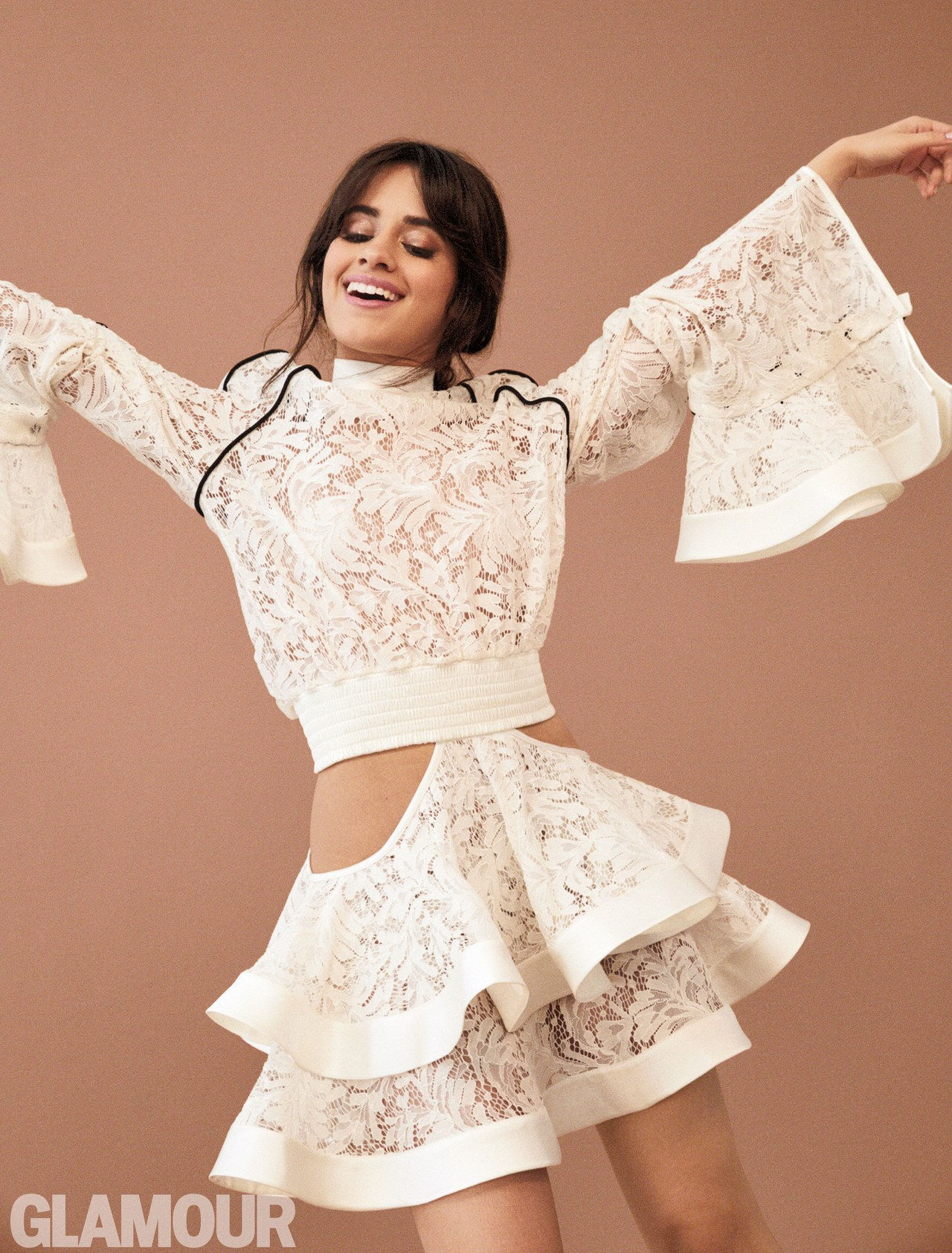
David Koma jacket, skirt.
CC: Yeah, sometimes, especially with social media. I don’t like when things just get so focused on being pretty for girls my age: “Oh, she’s so pretty, and this is so pretty, why can’t I be pretty like her?” You don’t get to improve yourself or your life when you’re just thinking about looks, looks, looks, looks. Social media is a huge part of that because you’re constantly seeing these unrealistic images of girls. I think it’s so important to be silly and fun and to be able to post a picture without makeup, because that’s normal. With me just starting my solo career, I can present myself the way that I want to.
GLAMOUR: How are you hoping to instill that kind of acceptance in everyone? What can we all do?
CC: Speak your truth. For me, that’s speaking about immigrant rights, about the Dreamers. I also love how Hayley Kiyoko is making videos with two girls in love—it’s not even super sexualized, but that’s just her truth, and a lot of my fans’ truths. Sharing makes everyone feel less alone.
GLAMOUR: The rituals and social bonding around beauty are a big part of Latina heritage. What did you learn from your mom?
CC: For my mom and all the [women] in our family, it’s about doing whatever you need to do to feel good about yourself. For instance, we have our beauty secrets: You crack open an egg, take out the yolk, put the white on your face, and let it dry up to close up your pores. I also do this honey mask—it gets really hot and moisturizes your skin. And we’re into putting oil all over your body and doing hair masks.
GLAMOUR: Any beauty regrets?
CC: The one time I wore red lipstick. I don’t like strong lips. Just strong women.
Aja Naomi King
Aja Naomi King is the kind of person who greets strangers with bear hugs (true story—that’s how she said hello to me on the Glamour shoot). She jumps off the screen in How to Get Away With Murder and The Birth of a Nation. So it’s hard to imagine why, when King, 33, first hit the audition circuit in Hollywood, she settled on the humble goal of getting cast as the best friend.
It was HTGAWM producer Shonda Rhimes and star Viola Davis who up-sized her dreams: “I walk into a set where I see this badass woman playing a badass woman,” says King. “Now my expectation is: I’m going to be the lead of a show.” And it’s happening. Already she’s been cast in the feature A Girl From Mogadishu (in which she stars as Somali female-genital-mutilation survivor and activist Ifrah Ahmed). And she’s the newest face for L’Oréal Paris, a role she cherishes since it will reinforce to “every black girl all over the world that a dark-skinned black woman is beautiful,” King says. Listen in as she reveals why that means so much to her:
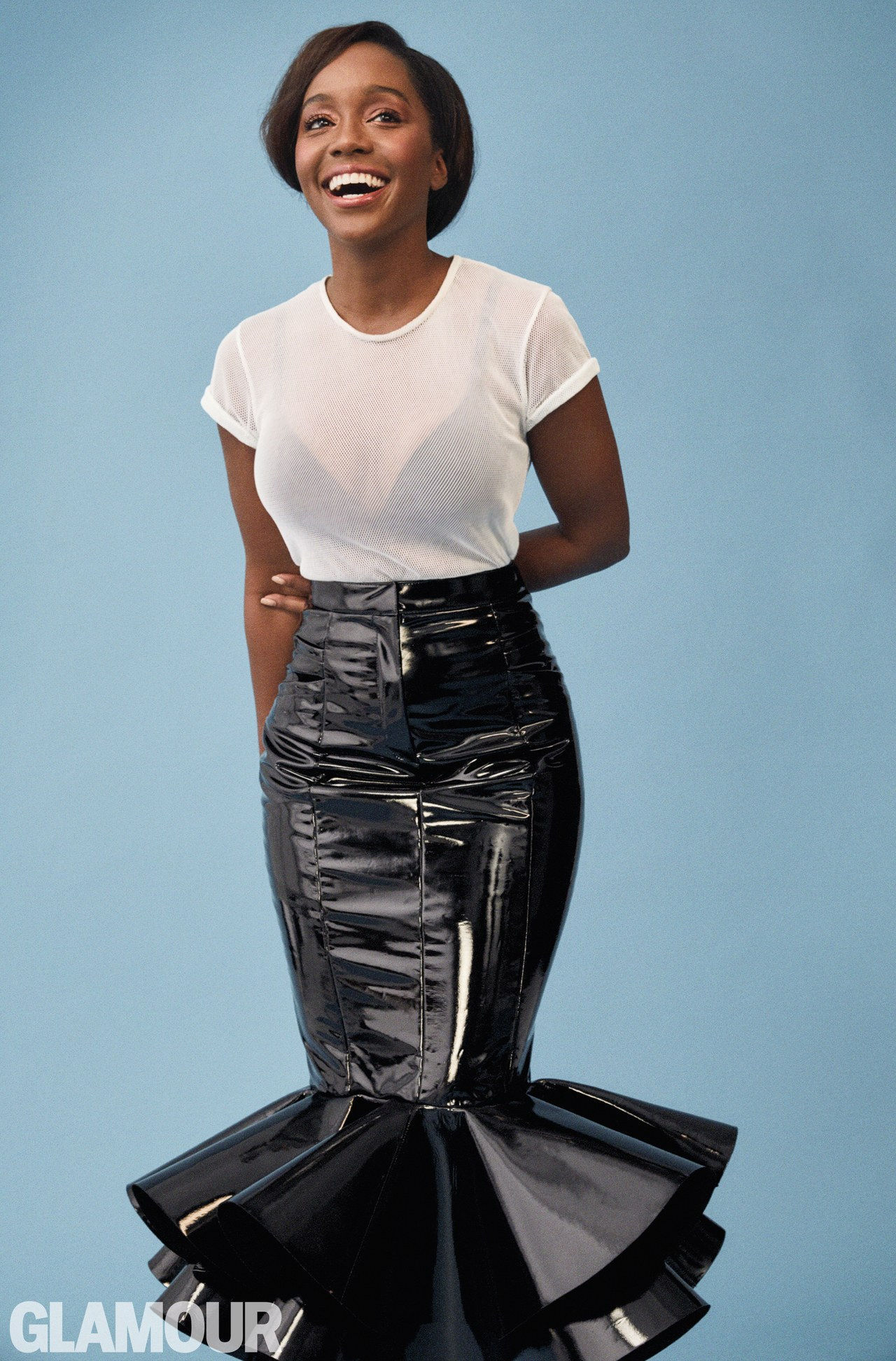
“I love my face, with or without makeup. But I love makeup.”
Tripp NYC by Daang Goodman shirt, $27. Hanro bra, $98. Balmain skirt.
GLAMOUR: Diversity and expanding the old definition of beauty is on everyone’s minds right now. Explain why it’s so personal for you.
AJA NAOMI KING: When you’re growing up in [minority] communities, you begin to question whether you are beautiful. And when you see an image of yourself being reflected from a magazine or a commercial or show, and that person is being touted as beautiful, then you get to look at yourself and think, Oh, that means me too.
GLAMOUR: Did you see yourself represented in pop culture as a kid?
ANK: I had shows like The Fresh Prince of Bel-Air, Family Matters, Sister Sister. But I noticed when I got older, there was nothing for my sister, who is eight years younger than me. Where were all the slice-of-life black characters in black communities?
GLAMOUR: You’re so right. There was a gap. But we’re seeing progress now, much due to Shonda Rhimes. How did she impact you?
“I don’t have to conform to anyone’s idea of what blackness or beautiful is.”
ANK: You look at all her shows, and it really is such diverse casting. It’s done wonders for me: Scandal. My God. Seeing Kerry Washington’s face on the side of buses in New York! She got to play the smartest woman in the room. And watching Viola Davis in the pilot of How to Get Away With Murder was tremendous—so honest and so baring, seeing this high-powered black woman taking off her wig. She holds nothing back. It’s so hard for people to look at those outside of their own race and understand them. The shows have helped change that.
GLAMOUR: Some people think that mascara or how you do your hair seems like a frivolous issue. But why is all that important?
ANK: For me personally, I love my face, with or without makeup. But I love makeup. And I love it when I see natural hair on TV, but I also love it when I see black women in straight hair. Or in wigs. Or in braids. I think we’re at a place now—I know for myself, I can’t speak for everyone—where the power is in knowing that I have a choice. I don’t have to conform to anyone’s idea of what blackness or beautiful is. Hi, this is Aja today, going out into the world. What are you gonna do about it?
GLAMOUR: Have you always had this unbreakable confidence?
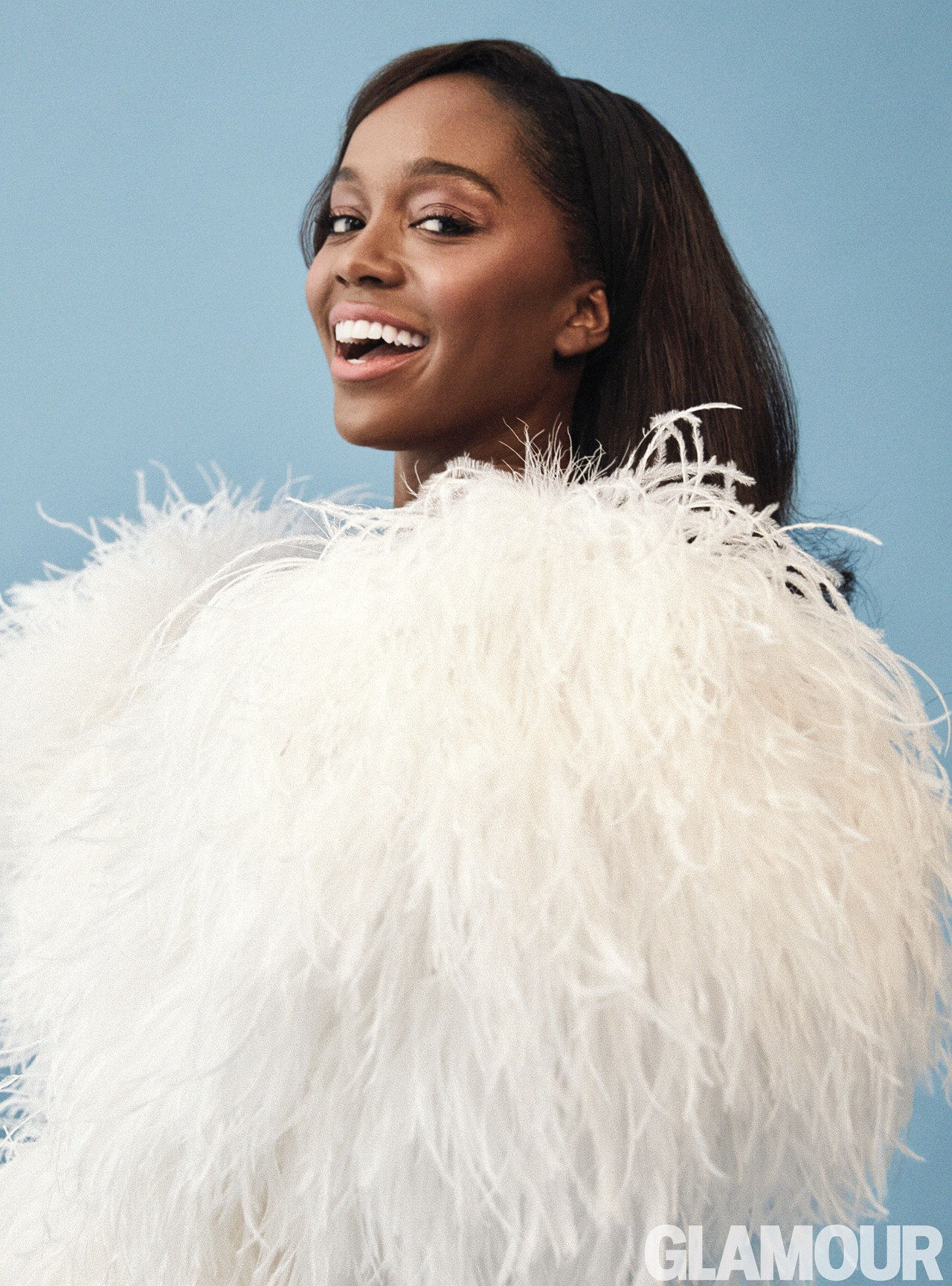
Saint Laurent by Anthony Vaccarello dress.
ANK: Growing up, I observed it in my mother—for a young black woman in the job market having to prove herself, makeup became a thing that said, “I am flawless, and you cannot critique that.” I watched her use it as a kind of armor. And I was able to grow into that boldness as well. There’s nothing like walking into an audition room and knowing that you are immediately being judged. But I used makeup to control the bad lighting or the camera quality.
GLAMOUR: When you came into the public eye, did you have your look all worked out?
ANK: Oh, no, no, no! I just thought I looked fine. That’s where Gabrielle Union, one of the kindest women I ever met in this industry, sat me down and said, “Let’s talk about your stylist, your makeup, your hair. What are you wearing on the red carpet? You’re a gorgeous girl. How are you making an impact?” It was extremely useful because you don’t know this stuff.
GLAMOUR: You’ve been outspoken about Time’s Up. And Harvey Weinstein was a producer on The Upside. Have these experiences informed your point of view?
ANK: I mean, yes. We were never unaware that sexual assault was an issue in this industry. But people weren’t speaking openly about it. And now phenomenal men and women are saying, “No more.” It impacts everyone, and everyone who kind of just watched and felt like they couldn’t do anything about it before can now be heard.
Know someone doing extraordinary things in her community? Nominate her for a L’Oréal Paris Women of Worth Award at womenofworth.com and she could win $10,000 for her cause.

